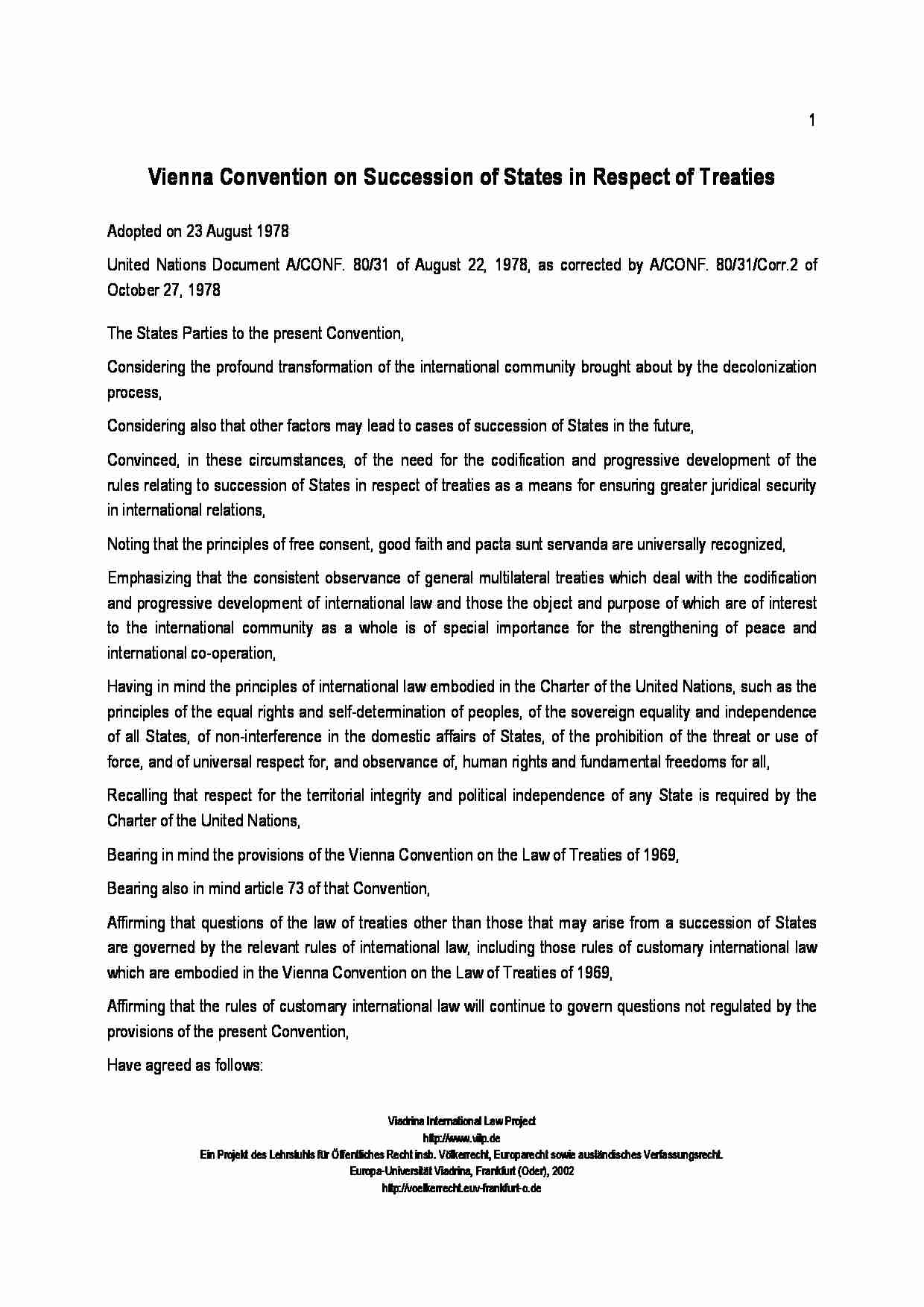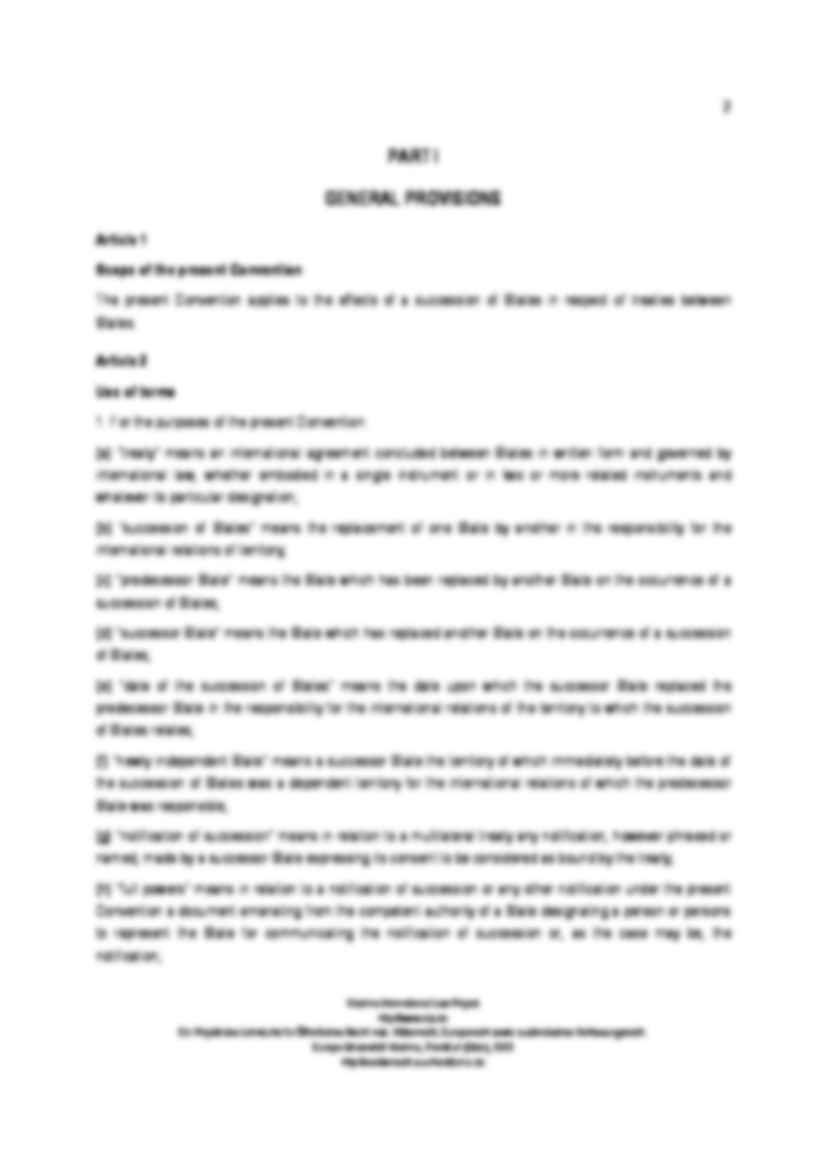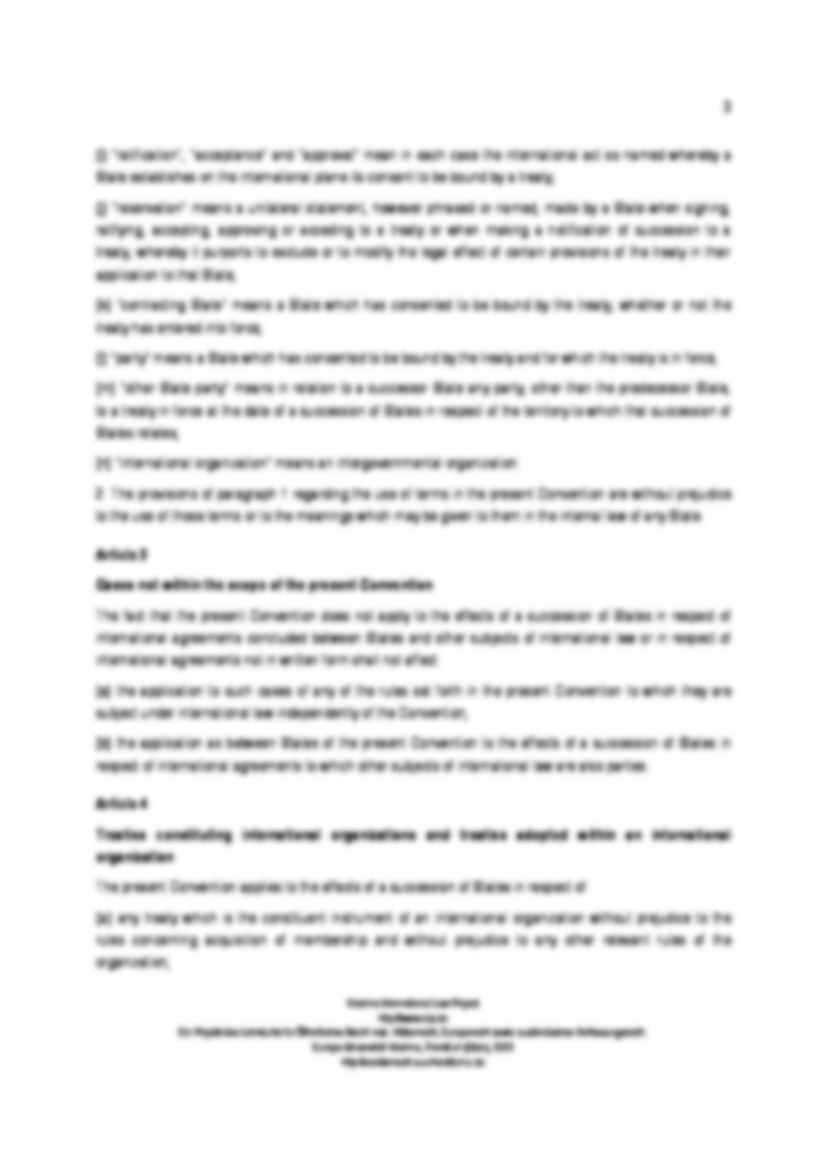


Fragment notatki:
1
Vienna Convention on Succession of States in Respect of Treaties
Adopted on 23 August 1978
United Nations Document A/CONF. 80/31 of August 22, 1978, as corrected by A/CONF. 80/31/Corr.2 of
October 27, 1978
The States Parties to the present Convention,
Considering the profound transformation of the international community brought about by the decolonization
process,
Considering also that other factors may lead to cases of succession of States in the future,
Convinced, in these circumstances, of the need for the codification and progressive development of the
rules relating to succession of States in respect of treaties as a means for ensuring greater juridical security
in international relations,
Noting that the principles of free consent, good faith and pacta sunt servanda are universally recognized,
Emphasizing that the consistent observance of general multilateral treaties which deal with the codification
and progressive development of international law and those the object and purpose of which are of interest
to the international community as a whole is of special importance for the strengthening of peace and
international co-operation,
Having in mind the principles of international law embodied in the Charter of the United Nations, such as the
principles of the equal rights and self-determination of peoples, of the sovereign equality and independence
of all States, of non-interference in the domestic affairs of States, of the prohibition of the threat or use of
force, and of universal respect for, and observance of, human rights and fundamental freedoms for all,
Recalling that respect for the territorial integrity and political independence of any State is required by the
Charter of the United Nations,
Bearing in mind the provisions of the Vienna Convention on the Law of Treaties of 1969,
Bearing also in mind article 73 of that Convention,
Affirming that questions of the law of treaties other than those that may arise from a succession of States
are governed by the relevant rules of international law, including those rules of customary international law
which are embodied in the Vienna Convention on the Law of Treaties of 1969,
Affirming that the rules of customary international law will continue to govern questions not regulated by the
provisions of the present Convention,
Have agreed as follows:
Viadrina International Law Project
http://www.vilp.de
Ein Projekt des Lehrstuhls für Öffentliches Recht insb. Völkerrecht, Europarecht sowie ausländisches Verfassungsrecht.
Europa-Universität Viadrina, Frankfurt (Oder), 2002
http://voelkerrecht.euv-frankfurt-o.de
2
PART I
GENERAL PROVISIONS
Article 1
Scope of the present Convention
The present Convention applies to the effects of a succession of States in respect of treaties between
States.
Article 2
Use of terms
1. For the purposes of the present Convention:
(a) "treaty" means an international agreement concluded between States in written form and governed by
international law, whether
(…)
… notification of succession is not signed by the Head of State, Head of Government or Minister for
Foreign Affairs, the representative of the State communicating it may be called upon to produce full powers.
3. Unless the treaty otherwise provides, the notification of succession shall:
(a) be transmitted by the newly independent State to the depositary, or, if there is no depositary, to the
parties or the…
… territory;
(c) "predecessor State" means the State which has been replaced by another State on the occurrence of a
succession of States;
(d) "successor State" means the State which has replaced another State on the occurrence of a succession
of States;
(e) "date of the succession of States" means the date upon which the successor State replaced the
predecessor State in the responsibility for the…
… notification, however phrased or
named, made by a successor State expressing its consent to be considered as bound by the treaty;
(h) "full powers" means in relation to a notification of succession or any other notification under the present
Convention a document emanating from the competent authority of a State designating a person or persons
to represent the State for communicating the notification of…
… State.
5. Subject to the provisions of the treaty, the notification of succession or the communication made in
connection therewith shall be considered as received by the State for which it is intended only when the
latter State has been informed by the depositary.
Article 23
Effects of a notification of succession
1. Unless the treaty otherwise provides or it is otherwise agreed, a newly independent…
… SecretaryGeneral either from the list or from the membership of the International Law Commission. Any of the periods
within which appointments must be made may be extended by agreement between the parties to the
dispute. Any vacancy shall be filled in the manner prescribed for the initial appointment.
3. The Conciliation Commission shall decide its own procedure. The Commission, with the consent of the
parties to the dispute, may invite any Party to the present Convention to submit to it its views orally or in
writing. Decisions and recommendations of the Commission shall be made by a majority vote of the five
members.
4. The Commission may draw the attention of the parties to the dispute to any measures which might
facilitate an amicable settlement.
5. The Commission shall hear the parties, examine the…
… territory to which the succession of States
relates from the date of the succession of States, unless it appears from the treaty or is otherwise
established that the application of the treaty to that territory would be incompatible with the object and
purpose of the treaty or would radically change the conditions for its operation.
PART III
NEWLY INDEPENDENT STATES
SECTION 1
GENERAL RULE
Article 16…
... zobacz całą notatkę

Komentarze użytkowników (0)